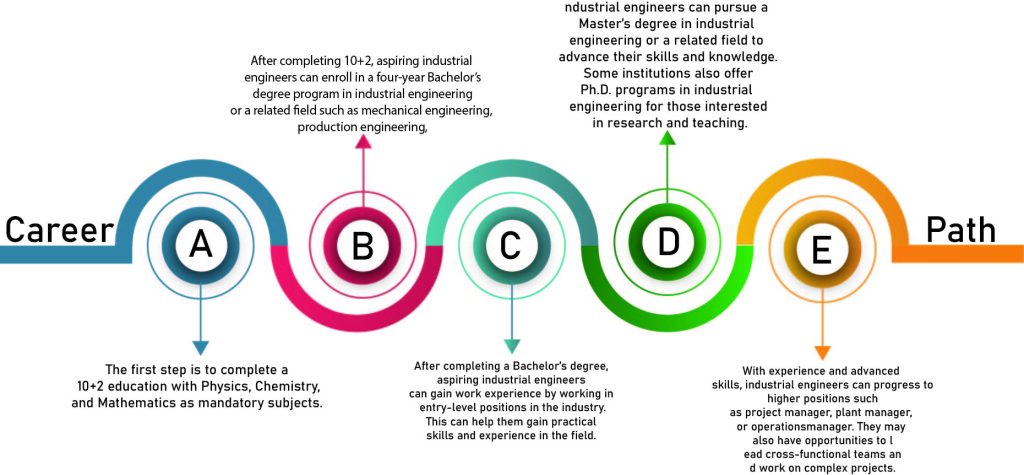Industrial engineering is a field of engineering that focuses on optimizing complex systems, processes, and organizations to improve efficiency, productivity, and quality. Industrial engineers use their knowledge of mathematics, science, and engineering to analyze, design, and manage systems in a wide range of industries, including manufacturing, healthcare, transportation, and services.

Work description
The work of industrial engineers involves analyzing and optimizing complex systems and processes within organizations. This includes identifying areas of inefficiency, developing and implementing solutions to improve productivity and quality, and measuring the results of these changes.
Industrial engineers also design and implement new processes, equipment, and facilities to improve performance and reduce costs. They may work with cross-functional teams, including managers, production staff, and other engineers to identify and solve problems, and may use tools such as statistical analysis, simulation, and optimization software to develop and test solutions.
Additionally, industrial engineers may provide training and support to staff to ensure that new processes are effectively implemented and maintained over time.
High Demand
Diverse range of industries to work in, including manufacturing, healthcare, transportation, and services.
Lucrative salaries
High demand for industrial engineers in the job market.
Opportunities for innovation
Opportunities for career advancement and leadership roles within organizations.
Versatility
Involvement in the development and implementation of new technologies and processes.
Flexibility
Ability to make a significant impact on the efficiency and productivity of organizations.
Job satisfaction
Competitive salaries and benefits.
High stress
Work may involve long hours, especially during project deadlines.
Long hours
Some job roles may require frequent travel, which can be a disadvantage for those with family commitments or personal preferences.
Competitive field
High level of responsibility and pressure to deliver results.
Constant learning
Computer engineers must constantly stay up-to-date with the latest technologies and advancements in the field, which requires ongoing learning and professional development.
Isolation
Work may involve exposure to hazardous environments in certain industries.
Eye strain and other physical health issues
Some industrial engineering roles may require a high level of physical activity or prolonged periods of standing or sitting.
The cost of pursuing a career in industrial engineering in India can vary depending on the type of program and institution chosen.
The cost of a four-year Bachelor’s degree in industrial engineering in India can range from INR 4-10 lakhs, depending on the institution.
The cost of a two-year Master’s degree in industrial engineering in India can range from INR 2-6 lakhs, depending on the institution.
The cost of a Ph.D. program in industrial engineering in India can vary significantly depending on the institution and the duration of the program. Generally, students are awarded scholarships or assistantships to cover their tuition and living expenses during their Ph.D. studies.
[wpcharts type=”horizontalbarchart” bgcolor=”red:gray:yellow,blue:gray:yellow,random:gray:yellow,purple:gray:yellow” min=”0″ legend=”true” titles=”2 year , 5 year” values=”3,7,5,12″]
The earning potential of an industrial engineer in India can vary depending on factors such as experience, industry, location, and company size. Generally, industrial engineers with more experience and advanced skills can command higher salaries.
An entry-level industrial engineer in India can expect to earn an average salary of INR 3-6 lakhs per year.
A mid-level industrial engineer with 5-10 years of experience can expect to earn an average salary of INR 7-12 lakhs per year.
Whereas, a senior-level industrial engineer with over 10 years of experience can expect to earn an average salary of INR 15-25 lakhs per year (approximately USD 20,500-34,000).
It’s important to note that these estimates are rough and may vary depending on factors such as the location of the job, the industry, and the size of the company. Additionally, earning potential may increase for those with advanced degrees, certifications, or specialized skills.
[wpcharts type=”horizontalbarchart” bgcolor=”red:gray:yellow,blue:gray:yellow,random:gray:yellow,purple:gray:yellow” min=”0″ legend=”false” titles=”Entry-Level, Mid-Career, Senior-Level ” values=”5,15,25,35,45,55″]
Strong problem-solving and analytical skills.
Attention to detail and ability to identify inefficiencies.
Aptitude for mathematics and statistical analysis.
Ability to work well in teams and communicate effectively.
Flexibility and adaptability to work in different industries and environments.
Willingness to continuously learn and stay updated with new technologies and advancements in the field.
Lack of attention to detail or focus on short-term gains rather than long-term solutions.
Inability to work collaboratively with others or communicate effectively.
Poor time management and organizational skills.
Lack of technical skills or willingness to continuously learn and adapt to new technologies and advancements.
Lack of passion or interest in the field, leading to disengagement and lack of motivation.
Inability to work under pressure or meet tight deadlines.
Work-life balance
The work-life balance of an industrial engineer can vary depending on factors such as the industry, company size, and job responsibilities. Industrial engineers typically work 40-50 hours per week, but this can vary depending on the company’s needs and deadlines. Some industrial engineers may be required to work overtime or on weekends to meet project deadlines. Industrial engineering jobs can offer some flexibility in terms of work hours and locations. Some companies may offer flexible work arrangements such as remote work or flexible hours.
Industrial engineers may work in a variety of settings such as manufacturing plants, offices, or warehouses. Depending on the environment, industrial engineers may need to follow specific safety protocols or wear protective equipment. Industrial engineering can be a high-pressure job, especially when working on complex projects with tight deadlines. To maintain a good work-life balance, industrial engineers may need to manage their time effectively and prioritize their workload. This can involve setting clear boundaries between work and personal life, taking breaks during the workday, and engaging in stress-reducing activities outside of work.

Industrial engineers help organizations improve their efficiency and productivity by optimizing processes and reducing waste.
Industrial engineers play a crucial role in developing new products and processes that can help organizations stay competitive and innovative.
Industrial engineers can contribute to sustainability efforts by developing environmentally-friendly processes and reducing the impact of industrial activities on the environment.
The industrial engineering field has the potential to create job opportunities, particularly in emerging industries such as renewable energy, healthcare, and transportation.
Industrial engineering can contribute to economic growth by improving the efficiency and competitiveness of organizations, which can lead to job creation and increased economic activity.
Industrial engineering has a global impact as it can help organizations in different countries and industries improve their operations, reduce costs, and increase productivity.
Operations Research
Operations research focuses on the use of advanced mathematical and statistical techniques to analyze complex systems and optimize decision-making processes.
Supply Chain Management
Supply chain management involves the coordination of activities involved in the production and distribution of goods and services, including sourcing, transportation, and inventory management.
Quality Control and Management
Quality control and management focuses on ensuring that products and services meet or exceed customer expectations by implementing quality control processes and techniques.
Manufacturing Engineering
Manufacturing engineering involves the design, implementation, and optimization of manufacturing processes and systems, including process planning, equipment selection, and production scheduling.
Human Factors and E rgonomics
Human factors and ergonomics focus on the interaction between people, technology, and the environment, with the goal of optimizing performance, safety, and comfort in work environments.
Conclusion:
In conclusion, industrial engineering is a dynamic and rewarding career choice that offers a range of opportunities in various industries. With the ability to improve efficiency, productivity, and sustainability, industrial engineers play a critical role in driving innovation and economic growth. Aspiring industrial engineers can pursue a variety of specializations and enjoy a promising career with competitive salaries and opportunities for growth and advancement.



